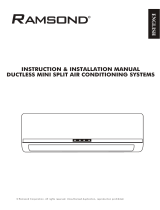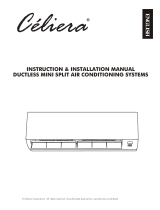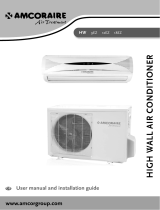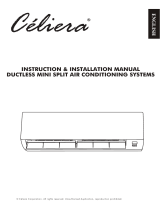
16
WARRANTY
LIMITED WARRANTY
ClimateRight distributor (hereinafter “Company”) warrants this
product against failure due to defect in materials or workmanship
under normal use and maintenance as follows. All warranty
periods begin on the date of original installation. If the date
cannot be veried, the warranty period begins one hundred
twenty (120) days from date of manufacture. If a part fails due
to defect during the applicable warranty period Company will
provide a new or remanufactured part, at Company’s option, to
replace the failed defective part at no charge for the part. This
limited warranty is subject to all provisions, conditions, limitations
and exclusions listed below.
• Seven (7) years on compressor and Five (5) years on all parts to
the original registered end-user.
• One (1) year warranty on remote control unit.
• Proper installation – Limited warranty applies only to systems
that are installed by a state certied or licensed HVAC
contractor, under applicable local and state law in accordance
with all applicable building codes and permits; ClimateRight
installation and operation instructions and good trade
practices. *State certied or licensed HVAC contractor not
required for warranty on the DIY series units. (Always check
your local laws.)
• Warranty applies only to products remaining in their original
installation location.
• Defective parts must be returned to the distributor through a
registered servicing dealer for credit.
LIMITATIONS OF WARRANTIES: ALL IMPLIED WARRANTIES
AND/OR CONDITIONS (INCLUDING IMPLIED WARRANTIES
OR CONDITIONS OF MERCHANTABILITY AND FITNESS FOR
A PARTICULAR USE OR PURPOSE) ARE LIMITED TO THE
DURATION OF THIS LIMITED WARRANTY, SOME STATES OR
PROVINCES DO NOT ALLOW LIMITATIONS ON HOW LONG AN
IMPLIED WARRANTY OR CONDITION LASTS, SO THE ABOVE
MAY NOT APPLY TO YOU. THE EXPRESS WARRANTIES MADE
IN THIS WARRANTY ARE EXCLUSIVE AND MAY NOT BE
ALTERED, ENLARGED, OR CHANGED BY ANY DISTRIBUTOR,
DEALER, OR OTHER PERSON, WHAT SO EVER.
THIS WARRANTY DOES NOT COVER:
1. Labor or other costs incurred for diagnosing, repairing,
removing, installing, shipping, servicing or handling of either
defective parts, or replacement parts, or new units.
2. Normal maintenance as outlined in the Owners Manual,
including lter cleaning and/or replacement and lubrication.
3. Failure, damage or repairs due to faulty installation,
misapplication, abuse, improper servicing, unauthorized
alteration or improper operation.
4. Failure to start due to voltage conditions, blown fuses,
open circuit breakers, or damages due to the inadequacy or
interruption of electrical service.
5. Failure or damage due to oods, winds, res, lightning,
accidents, corrosive environments (rust, etc.) or other
conditions beyond the control of the Company.
6. Parts not supplied or designated by Company, or damages
resulting from their use.
7. Products installed outside USA and Canada.
8. Electricity or fuel costs, or increases in electricity or fuel
costs from any reason whatsoever, including additional or
unusual use of supplemental electric heat.
9. Any cost to replace, rell or dispose of refrigerant, including
the cost of refrigerant.
10. Any special, indirect or consequential property or
commercial damage of any nature whatsoever. Some
states or provinces do not allow the exclusion of incidental
or consequential damages, so the above limitation may not
apply to you.
For additional warranty exclusions, visit www.climateright.com
This warranty gives you specic legal rights, and you may also
have other rights which vary from state to state or province to
province. For warranty service or repair, contact your installing
contractor. You may nd the installer’s name on the equipment
or in your Owner’s packet.
HOW TO FILE A WARRANTY CLAIM:
All warranty claims must be submitted in writing or received
and conrmed by email from an authorized ClimateRight
representative. A web form is also available at
www.climateright.com/featured/product-registration-and-
warranty to submit your claim as well. If ClimateRight LLC, at
its sole discretion, deems your Warranty claim valid, a prepaid
shipping label will be sent to the address provided for return of
the climate right unit for inspection and repair or replacement.
In good faith, we will send you out a replacement unit before
receiving the defective unit back. If, during inspection, the unit
has been found to be defect free or has been modied in any
way to cause a defect, the customer will be charged for the
replacement unit plus shipping and handling fees and no refund
will be issued for the initial purchase. If the unit has been found
to be defective the original purchase price will be refunded.
Please note: Any damage caused by improper packaging of
the return unit to the authorized service center will void the
warranty.
BUYER’S REMORSE POLICY:
If you are not completely satised with the product received,
ClimateRight will accept the return of the product within 30
days from the date of purchase. Customer will be responsible
for the return shipping costs associated with shipping the
product back to ClimateRight. Customer is responsible for the
proper packaging of the product for return ensuring no damage
to the product while in transit as well as any lost packages.
Once we receive the product back, we will do a thorough
inspection verifying that there is no damage to the product and
that all accessories are included, and will, at that time, issue a
full refund.

























